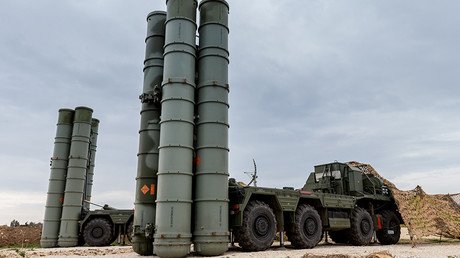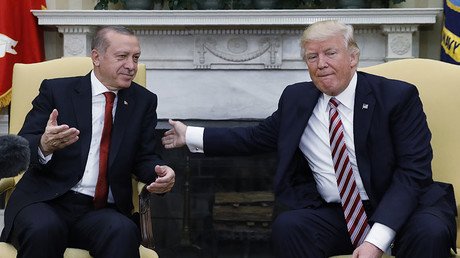Turkish President Recep Tayyip Erdogan announced that the country’s troops have left ongoing NATO war games ahead of schedule, after his name appeared in an “enemy chart.” The move comes amid tensions between the US and Turkey within the military bloc.
On Friday, the Turkish leader slammed an “incident” during NATO drills in Norway, in which Erdogan himself and Mustafa Kemal Ataturk, who founded the modern Turkish state, were depicted in an “enemy chart.”
"They used an enemy chart in Norway. In that chart, there was my name and [Mustafa Kemal] Ataturk's picture," the Turkish leader told his Justice and Development (AK) Party members, as cited by Turkish media.
Erdogan said it was decided to withdraw all 40 Turkish soldiers from a NATO drill “immediately,” adding that even the removal of those names would not change the decision.
“There can be no alliance like that," Erdogan said.
Later in the day, Norwegian media reported that NATO Secretary General Jens Stoltenberg had apologized for the “offence,” saying that “the incidents were the result of an individual’s actions and do not reflect the views of NATO.” The apology was contained in a letter from Stoltenberg, which was obtained by NTB agency. The Secretary General said that an investigation into the incident is ongoing, and added that the person responsible for the offence had been “removed from the exercise.”
“The individual in question was immediately removed from the exercise by the Joint Warfare Centre, and an investigation is underway. He was a civilian contractor seconded by Norway and not a NATO employee,” he said.
According to the NATO website, Norway is currently hosting a Trident Javelin 17 military exercise, as well as Polaris-17 and Gram-17 drills, aimed at improving Norway’s military ability “to execute high-intensity national and NATO operations within Norwegian territory.” It is not clear what maneuvers Erdogan was referencing.
Turkey is currently at loggerheads with some of its allies within the military alliance. Ankara’s decision to buy Russian S-400 anti-aircraft systems triggered concerns among its NATO member states, including the US. Erdogan lashed out at his critics, saying that he is not going to wait for protection from NATO allies.
In October, NATO Secretary-General Jens Stoltenberg said that Ankara’s decision to purchase the S-400 does not harm the alliance’s interests. As the deal enters its final stage, the US reportedly supports Stoltenberg’s view, saying that it could affect Turkey’s use of F-35 jets.
“Right now, I can tell you our policies do not allow us to be interoperable with that system,” Heidi Grant, Air Force deputy undersecretary for international affairs, stated as cited by Defense News.
“It’s a significant concern, not only to the United States, because we need to protect this high-end technology, fifth-generation technology” but for “all of our partners and allies that have already purchased the F-35,” Grant said.
Turkey is involved in production of the advanced F-35 aircraft, with one of 10 participating firms being a sole source supplier for its two major components – missile remote interface units and the panoramic cockpit display. The possibility of simultaneous use of both Russia’s S-400 systems and the F-35 could harm the security of the latter, Defense News reported, citing analysts’ concerns.



